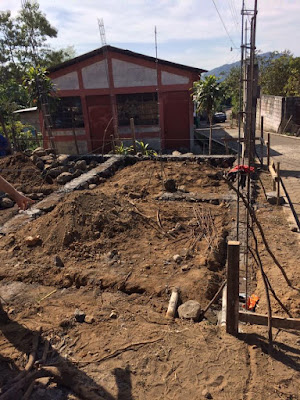Thinking About Missions
 Ever since I was in high school, mission trips have been a part of my life. I participated in home
Ever since I was in high school, mission trips have been a part of my life. I participated in homerepair trips, community service trips, and an international mission. One summer, I chose to work for the organization that did so much to spur on my faith and ran a mission trip site with two other people. Motivated by this and knowing I was going into public health, I also took a class last year that critically looked at humanitarianism. So when a friend of mine recently questioned how much good they actually do, I felt like I was just the person to give an answer. But, as per usual, I did a mediocre job at best trying to explain that on the spot with limited time. So, I want to try to do a better job of it now.
Having had so many different experiences within the realm of mission trips, I have seen plenty of great and not so great things. I read many of the articles circulating social media a couple years ago that denounced and challenged mission trips (here and here are some examples). Basically, I just want to get the point across that I know this "industry," if you will, has its flaws and skeptics raise good questions. So I want to walk through some of them and provide my reasons why I still find mission/service trips important and worthwhile.
1) Volunteers, even though their hearts are in it, often do more harm than good with home repair and construction jobs because they don't have the skills to do them.
Yeah, that's a valid issue. On the one hand, people are offering free labor (heck, they're paying to supply labor) to do things that those they are serving might not have otherwise been able to afford to do. But, what happens when you don't have the skills to do the job well? Best case scenario, the job looks a little sloppy, but that's the only concern. Worst case scenario, a structure is built that is unsafe and/or will quickly fall into disrepair and need to be redone. But in the eyes of the volunteers, they came and made things a little better than before - not knowing what happens after they leave at the end of the week.
I have been in a situation like this. During my trip to Guatemala, one of the projects my group helped with was building a fuel-efficient stove for a family in town. It should come as no surprise that none of us have done this before. Thankfully, we were under the direction of two men whose jobs are to build these, so we figured we couldn't mess up too badly. Especially since they gave us very basic tasks (with a combination of Guesstures and Spanglish). Nevertheless, we still managed to break 1 or 2 bricks the stove needed. They don't purchase extras, so they had to make do with our mistakes. Just like they have with plenty of other groups like ours. Don't get me wrong, we felt awful and were prepared to buy replacements if we could. But Wilmur told us they would use what they had.
2) Volunteers spend so much money to go on these trips when it could be used to pay local workers to do the same jobs instead or given directly to those in need.
Another valid point. It is not cheap to go on these trips - domestic or international. Youth groups typically fund raise for at least a year before departing to try to make the trip more financially feasible for themselves. And even then, the remaining sum to be paid is sizable. Sure, some of the money goes towards supplies so that those being served don't need to buy them. But the organization in the middle has its own staff and overhead to pay, even if they try to limit the amount of money spent on these things. And there's food, transportation, and lodging to consider for the volunteers. It all adds up. It is something to consider - how that money is best spent. But just looking at it in this light doesn't capture the whole picture.
The people who are being served do realize the amount of money these volunteers spend to come to them. And their immediate reaction rarely is "I wish you would have just given us the money you spent to be here." They recognize the sacrifice that has been made. That you have chosen to come and encounter them and help in a way that they have been waiting for. That, in my case for the international trip, I had technically worked over 100 hours (5-6 weeks) just to come there. Another example is how a woman tending a school's learning garden in Pennsylvania over the summer was overwhelmed by kids coming from as far as Hawaii to help her when community members wouldn't. This example actually leads me into the last thing I want to speak to.
3) Why do you need to travel hours to do this work when there's work to be done in your own community?
Yeah, this is important. And honestly, is best addressed by the groups choosing to go on these trips. The leaders have a role in what role these trips should play. Are they meant to be a one-and-done thing for that group? A "check box" good Christian/human deed for the year? Or are they meant to be the thing that gets otherwise disinterested youth excited about service and have a more expanded worldview? Let's be honest, for a teen growing up in Wisconsin, a trip to Ohio where you meet people from across the US and stop in Cedar Point sounds more appealing than helping at a local soup kitchen. Yes, the majority of my church group could have cared less about where we actually went and the bells and whistles that came with it. I mean, we did care in that they were part of the experience, but those things didn't have much sway in whether we would go or not. But those extra fun things do attract people who might not otherwise have chosen to go the first time around.
The key is to emphasize that service doesn't end there. To come back and point out that what was needed at those mission sites is not necessarily unique to those communities. Some people make that connection automatically and others don't. Another key is to organize local service opportunities where the teens have some input in the project. To take advantage of their interest from the trip and give them a greater sense of ownership in the service they do. So, in a sense, that great experience didn't fully end because it is being used to transform their home community.
-------------------------------------------------------------------------------------------------------------------------
I could talk more about a lot of different aspects of these trips. How it looks from the inside versus being a participant. How I have personally been impacted. Some of the great stories and horror stories I both experienced and learned of from my class. Honestly, this is one of my favorite general topics of conversation. But this is enough to chew on. Let me know what you think, I'll happily respond.
-------------------------------------------------------------------------------------------------------------------------
I could talk more about a lot of different aspects of these trips. How it looks from the inside versus being a participant. How I have personally been impacted. Some of the great stories and horror stories I both experienced and learned of from my class. Honestly, this is one of my favorite general topics of conversation. But this is enough to chew on. Let me know what you think, I'll happily respond.



Comments
Post a Comment